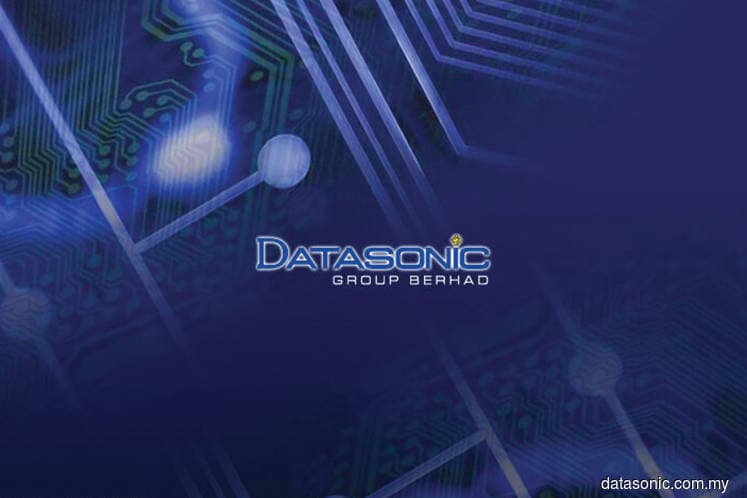
This article first appeared in The Edge Malaysia Weekly on October 29, 2018 - November 4, 2018
LAST Thursday, Datasonic Group Bhd ended trading at 41.5 sen — a five-year low. Over the past couple of weeks, the counter has shed 26 sen, a tad more than 40%, on the back of heavy trading volume, largely because the company was named in a charge sheet involving former deputy prime minister Datuk Seri Ahmad Zahid Hamidi on Oct 19.
The continued fall in Datasonic’s stock was not a knee-jerk reaction and its shares have yet to stage a rebound of any sort.
Even an interim dividend payment of one sen, going ex on Nov 8, announced a few days after the issue, failed to lift sentiment.
To recap, Ahmad Zahid, who is the former home affairs minister, is alleged to have received payment in the form of two cheques — for RM5 million and RM1 million — issued by Sarana Kencana Sdn Bhd on April 27, 2016, from Datasonic’s deputy managing director Chew Ben Ben, for Datasonic to secure a contract to supply IT chips for passports.
Ahmad Zahid is said to have facilitated the appointment of Datasonic Technologies Sdn Bhd, a wholly-owned unit of Datasonic, to undertake a five-year contract to provide 12.5 million chips for passports to the Immigration Department, via direct negotiation with the Ministry of Home Affairs.
Datasonic managing director Datuk Hanifah Noordin says the management was caught by surprise but that being named in the charge sheet is not a big setback for Datasonic.
“For the company, it is business as usual … maybe it is a setback for the shares, but I think it will blow over,” he says.
On whether Datasonic would be investigated, especially after Malaysian Anti-Corruption Commission deputy chief commissioner of operations Datuk Azam Baki indicated that companies and individuals involved in corrupt practices will be investigated, Hanifah says the two — Datasonic and Sarana Kencana — are separate legal entities.
A check with RAM Credit Information reveals that Sarana Kencana is wholly owned by Hanifah, and the directors are his family members and him.
“What has Datasonic got to do with Sarana Kencana? In my line of business, I have several caps. I put on my Sarana Kencana cap, I am also a director of Datasonic and I am also a director of many other companies … so, what has Sarana Kencana got to do with Datasonic?” he asks.
On whether there is any link between the two companies as they have similar shareholders — Hanifah has 28.38% in Datasonic, and wholly owns Sarana Kencana — Hanifah brushes such a notion aside. It is also worth noting that Chew is the second largest shareholder in Datasonic with 25.33% equity interest.
On there being any questions about the award of contracts to Datasonic, Chew says, “It [the contract awards] is all on merit.”
According to its website, Datasonic has been securing contracts for visa and pass systems and secure identification since 1996. Some of the larger contracts it has secured include a RM318.75 million contract to deliver 12.5 million passport chips, in December 2015; a RM270.71 million contract to deliver 9.96 million polycarbonate data pages, in April 2018; and a RM223.38 million job for 13.42 million passports in April 2016, among others.
It is noteworthy that Chew is still involved in the day-to-day operations at Datasonic.
In an announcement to the local bourse, Datasonic clarified that neither the company nor any of its directors had made any payments to Ahmad Zahid in relation to the supply of chips for passports, and that its subsidiary, Datasonic Technologies Sdn Bhd, won a five-year contract to supply passport polycarbonate datapages and printing system on a per passport produced basis, through an open tender in April 2012.
The company also clarified that it was awarded the supply of 12.5 million chips on Dec 15, 2015, based on enhanced chip security (bonded into the polycarbonate datapage as opposed to the back of the passport cover) and 15% lower pricing, working out to total savings of RM56.25 million to the government over five years.
Chew also tells The Edge that it is common for the passport and chip contracts to be awarded to the same company.
But then, this is not the first time that Datasonic has been viewed as linked to Umno, the dominant party in the coalition that ruled the country for 61 years.
In 2014, Datasonic was looking to acquire a 30% stake in Fuelsubs House Sdn Bhd, a company bidding to manage fuel subsidies for the government, but the acquisition hinged on Fuelsubs securing the contract to implement the project.
Towards this end, Datasonic inked an agreement with HKS Primatrix Sdn Bhd, Datuk Habibul Rahman Kadir Shah, Datuk Razali Merican Naina Merican and Zaid Kadershah, the shareholders of Fuelsubs, some of whom were known Umno personalities.
Habibul Rahman, especially, was known to be a close associate of former premier Datuk Seri Najib Razak.
However, Chew says the deal was aborted in 2014, indicating that Habibul had no other role in Datasonic.
Then again, to say that Datasonic is linked to Najib may not be entirely accurate as Datasonic’s non-executive chairman Tan Sri Mohamed Hashim Mohd Ali, who has been on board the company since end-June 2011, is the brother of Tun Dr Siti Hasmah Mohamad Ali, the wife of current prime minister Tun Dr Mahathir Mohamad.
Nevertheless, whether Datasonic continues to receive government contracts for secure identification and smart-card personalisation systems remains to be seen.
For its first three months ended June, Datasonic raked in RM7.39 million in net profit from RM48.78 million in revenue. In contrast to the corresponding period a year ago, net profit was down 51.12% while revenue dipped by 18.83%.
For now, the question is, is the worst over for Datasonic?
Save by subscribing to us for your print and/or digital copy.
P/S: The Edge is also available on Apple's AppStore and Androids' Google Play.